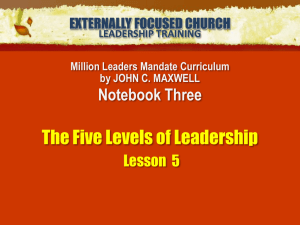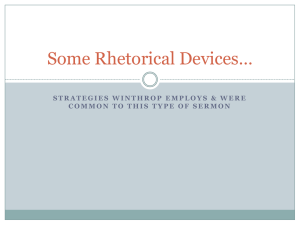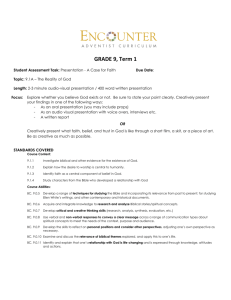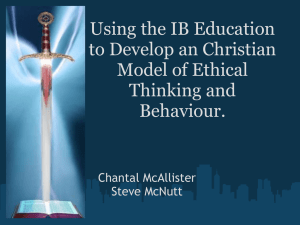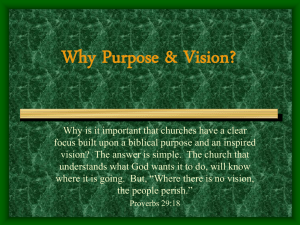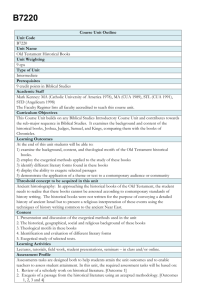ethics notes - Centennial Christian School
advertisement
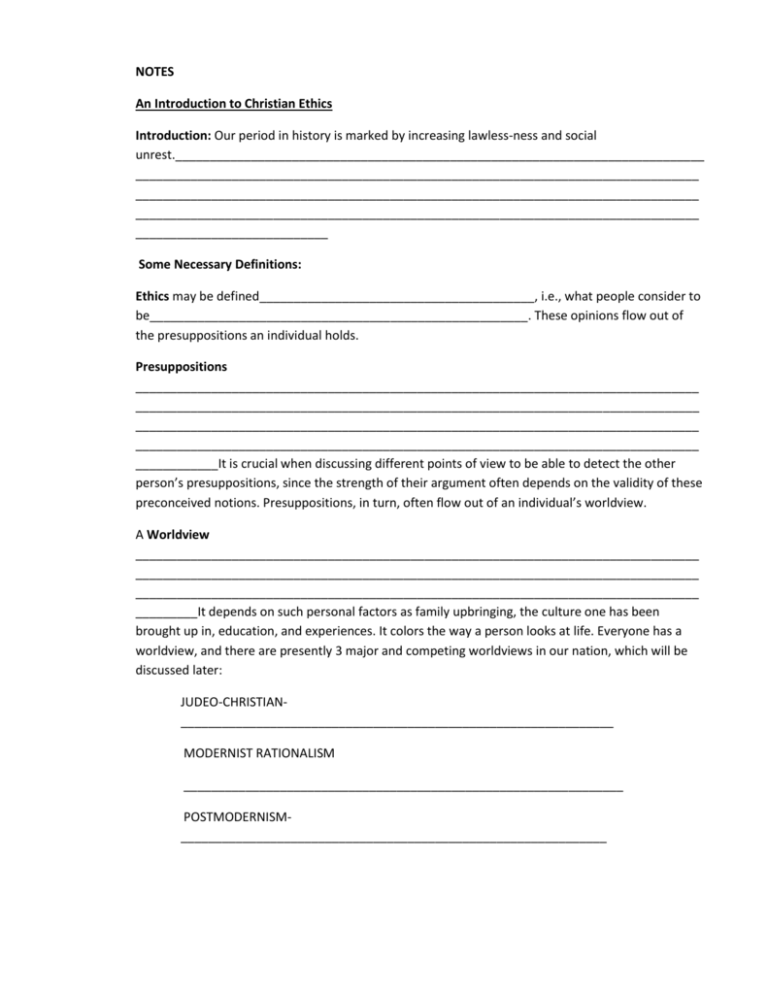
NOTES An Introduction to Christian Ethics Introduction: Our period in history is marked by increasing lawless-ness and social unrest._____________________________________________________________________________ __________________________________________________________________________________ __________________________________________________________________________________ __________________________________________________________________________________ ____________________________ Some Necessary Definitions: Ethics may be defined________________________________________, i.e., what people consider to be_______________________________________________________. These opinions flow out of the presuppositions an individual holds. Presuppositions __________________________________________________________________________________ __________________________________________________________________________________ __________________________________________________________________________________ __________________________________________________________________________________ ____________It is crucial when discussing different points of view to be able to detect the other person’s presuppositions, since the strength of their argument often depends on the validity of these preconceived notions. Presuppositions, in turn, often flow out of an individual’s worldview. A Worldview __________________________________________________________________________________ __________________________________________________________________________________ __________________________________________________________________________________ _________It depends on such personal factors as family upbringing, the culture one has been brought up in, education, and experiences. It colors the way a person looks at life. Everyone has a worldview, and there are presently 3 major and competing worldviews in our nation, which will be discussed later: JUDEO-CHRISTIAN_______________________________________________________________ MODERNIST RATIONALISM ________________________________________________________________ POSTMODERNISM______________________________________________________________ Absolute Truth __________________________________________________________________________________ __________________________________________________________________________________ __________________________________________________________________________________ _________ Relativism. __________________________________________________________________________________ __________________________________________________________________________________ __________________________________________________________________________________ __________________________________________________________________________________ ____________ II. Different Approaches to Deciding What Is Right and Wrong ANTINOMINIANISM (Grk: „anti‟ = “instead of” + „nomos‟ = “law”). There are no objective moral laws or principles by which an issue can be judged as being right or wrong, good or evil GENERALISM - There are general laws but no universal or absolute laws. These general rules may occasionally be broken. SITUATIONISM - There is only one law or norm, and it applies universally. This rule typically states that in any situation one must do the loving thing, or the thing which brings the greatest good to the greatest number of people. ABSOLUTISM - There are absolute, universal laws. This is the biblical approach, although a form of absolutism known as natural law, which holds that certain laws of conduct are universally known by reason or intuition apart from special revelation, has been supported by theists and unbelievers alike (see Rom. 1:18 32 and 2:14-16). Christians view absolutism one of three ways: UNQUALIFIED (non-conflicting) absolutism believes in many absolute laws that never conflict and should never be broken. IDEAL (conflicting) absolutism believes that universal laws do sometimes come in conflict, and although one may be forced to break one law (e.g., err or sin) to keep another, doing the lesser evil is excusable or forgivable. GRADED absolutism (hierarchicalism) believes that universal laws are divinely “graded” as to their significance, and when they come in conflict we are responsible to obey the “higher” law. II. A Biblical Basis for Decision Making Among God‟s attributes are that: He is the GOD of TRUTH (Psalm 31:5), He SPEAKS only the truth (Isa. 45:19), and that truth is UNCHANGING (Mal. 3:6). His truths—for instance, those dealing with salvation and the nature of mankind— __________________________________________________________________________________ __________________________________________________________________________________ ______ Note Jesus‟ dogmatic assertion that he was THE TRUTH (John 14:6). Given the above, this means that what God—and His prophets in Scripture—say about ethical issues of right and wrong, good and evil is TRUE, __________________________________________________________________________________ __________________________________________________________________________________ __________________________________________________________________________________ _________The biblical principles of purity, justice, honesty, love, etc. which form the basis of biblical ethics flow out of the NATURE of GOD, since God is love, just, truth, etc. Biblical ethics, therefore, are a reflection of and are grounded in the Creator Himself. **** Note: It is obvious that many of the ethical issues we deal with today are not specifically addressed in the Bible, since the writers of Scripture did not live in a day where, for instance, the control of certain aspects of life and death medically (or via genetic engineering) was possible as it is today. However, there are principles set forth in the Scriptures by which such contemporary ethical issues may be evaluated.**** IV. The Historical Decline of Biblical Ethics (How We Got Where We Are) Western culture (Europe and America) was once characterized by a Judeo-Christian ethic; the Bible dictated the norms and absolutes that men, women, and society in general lived by. Scientists, mathematicians and philosophers presupposed a Creator and merely sought to discover His truth and design which were already inherent in nature. Thus, not only morality but the very concept of TRUTH ITSELF was grounded in the character and nature of God. A number of historical movements or periods eventually led to the gradual abandonment of this biblical ethic, and are summarized as follows: The RENAISSANCE (12th - 16th centuries ) __________________________________________________________________________________ __________________________________________________________________________________ __________________________________________________________________________________ ENLIGHTENMENT or Age of Reason (17th - 18th centuries) __________________________________________________________________________________ __________________________________________________________________________________ __________________________________________________________________________________ _________ The INDUSTRIAL REVOLUTION (18th - 19th centuries) __________________________________________________________________________________ __________________________________________________________________________________ __________________________________________________________________________________ __________________________________________________________________________________ ____________ These historical trends, in turn, created a fertile ground for the revolutionary thoughts of several men whose ideas have greatly impacted the 20th century: CHARLES DARWIN (1809 - 1882) __________________________________________________________________________________ __________________________________________________________________________________ __________________________________________________________________________________ __________________________________________________________________________________ __________________________________________________________________________________ _______________ KARL MARX (1818 – 1883) __________________________________________________________________________________ __________________________________________________________________________________ __ FREDERICH NIETZSCHE (1844 - 1900) __________________________________________________________________________________ __________________________________________________________________________________ __________________________________________________________________________________ __________________________________________________________________________________ ____________ SIGMUND FREUD (1856 - 1939) __________________________________________________________________________________ __________________________________________________________________________________ __________________________________________________________________________________ __________________________________________________________________________________ ______. Values were now relative and man-made. Since there was no God, there was no higher authority to appeal to than the individual himself. This laid the foundation for the two prominent non-Christian worldviews that have ruled Western society during the last half of the 20th century: Modernism - a merger of SCIENTIFIC NATURALISM, which holds that life is the product of impersonal, random processes acting through time, and LIBERAL RATIONALISM, which realizes that, since man is on his own, he makes the rules. Whereas scientific naturalism provides our modernist culture with its view of reality, liberal rationalism provides the ethic. In our society, this liberal ethic focuses on individual rights and autonomy almost to the exclusion of group concerns. Postmodernism - a philosophy that has emerged during the last two decades of this century. Whereas postmodernism agrees with modernism that there are no absolutes, it rejects modernist rationalism and any insistence on truth. Intellect is replaced by the will, and emotions (feelings) take precedent over reason. What was considered historical reality is now DECONSTRUCTED (changed) to suit preconceived liberal biases. Morality and truth do not exist objectively but are constructed by the individual society. MULTICULTURISM is promoted; the concern of the “group” takes precedence over the individual. From its conception Postmodernism has collapsed in on itself. V. A Biblical Response In response to the assertions above, a Christian might counter with one of the following approaches: Challenge their PREMISE (presuppositions) - Grant their premise—that the God of Christianity and the Bible is unreal (the myth of a prescientific imagination)—and “anything goes” so far as ethics are concerned, with virtually any form of immorality being justified. But if God (as revealed in the Scriptures) does indeed exist, then their view of reality is warped and they will ultimately face the consequences of offending a holy God. This approach rests on the authority of Scripture and finds support in Christian apologetics, which is outside the realm of this series. Challenge the CONSISTENCY of their Worldview - If there is no higher authority than the individual, and especially if reason cannot be appealed to, then who can say, with any authority, what is right or wrong? Hitler justified his ethic of genocide, and the question of “rightness” or “wrongness” is purely a matter of opinion! Or as Yale Law School professor Arthur Leff notes, the response to assertions of authority in our society is “the grand sez who.” Right becomes defined by who has the most might! Challenge the “FRUITS” of their Ethics - Since the Judeo-Christian (biblical) ethic has been discarded by more relative, liberal norms, crime has soared, suicide has mushroomed among youth, sexually transmitted diseases have become epidemic, and the list of social blights goes on. The grim consequences of our changing values will be spotlighted in future lessons. Christian Perspectives 12, 2015-2016 Adapted from Reason in the Balance by Phillip E. Johnson (Intervarsity Press) Lifeviews by R.C. Sproul (Revell.A Shattered Visage by Ravi Zacharias (Baker Books) Can Man Live Without God by Ravi Zacharias (Word Publishing) Postmodern Times by Gene Edward Veith, Jr. (Crossway Books) ) © Trinity Baptist Church, Renton, WA., ARR
